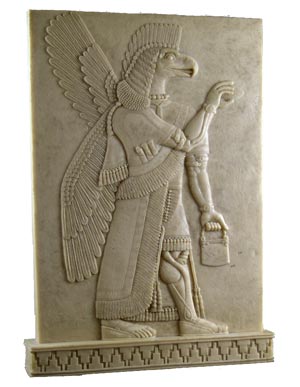
Assyrian
Assyria was a civilization centered on the Upper Tigris river, in Mesopotamia (Iraq), that came to rule regional empires a number of times in history. It was named for its original capital, the ancient city of Assur (Akkadian: Aššur; Arabic: أشور Aššûr; Hebrew: אַשּׁוּר Aššûr, Aramaic: Ašur, Atur). The term Assyria can also refer to the geographic region or heartland where these empires were centered.
During the Old Assyrian period (20th to 15th c. BCE, Assur controlled much of Upper Mesopotamia. In the Middle Assyrian period (15th to 10th c. BCE), its influence waned and was subsequently regained in a series of conquests. The Neo-Assyrian Empire of the Early Iron Age (911 – 612 BCE) expanded further, and under Ashurbanipal (r. 668 – 627 BCE) for a few decades controlled all of the Fertile Crescent, as well as Egypt, before succumbing to Neo-Babylonian and Median expansion, which were in turn conquered by the Persian Empire.
During the Old Assyrian period (20th to 15th c. BCE, Assur controlled much of Upper Mesopotamia. In the Middle Assyrian period (15th to 10th c. BCE), its influence waned and was subsequently regained in a series of conquests. The Neo-Assyrian Empire of the Early Iron Age (911 – 612 BCE) expanded further, and under Ashurbanipal (r. 668 – 627 BCE) for a few decades controlled all of the Fertile Crescent, as well as Egypt, before succumbing to Neo-Babylonian and Median expansion, which were in turn conquered by the Persian Empire.




















